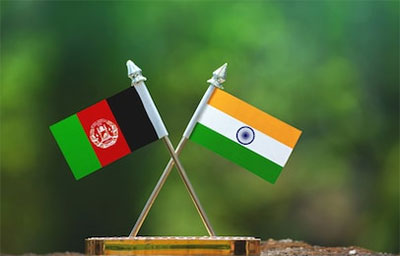Date : 04/10/2023
Relevance: GS Paper 2- International Relations - Bilateral Relations
Keywords: Jaish-e-Muhammad (JeM) and Lashkar-e-Taiba (LeT), ISI, Afghan-led Government
Context-
- On September 30, the Embassy of Afghanistan in Delhi officially announced its closure. This move had been anticipated and was attributed to several factors outlined in the official statement. These factors included a lack of cooperation from the Government of India and resource constraints that hindered the embassy's operations.
- Importantly, the embassy requested the Indian government to hoist the flag of the Islamic Republic of Afghanistan over its premises and expressed a desire for the mission to eventually be handed over to a "legitimate government" of Afghanistan.
Background of Afghanistan-India Relations:
- The embassy represented the Islamic Republic of Afghanistan, which was deposed by the Taliban on August 15, 2021, through a military campaign.
- India did not recognize the Taliban as the de facto rulers of Afghanistan.
- Since August 2021, the Embassy of Afghanistan in New Delhi has been operating as a "stateless mission," primarily assisting Afghan citizens and travelers in India due to the absence of diplomatic relations between India and the Taliban-led government in Kabul.
- Ambassador Farid Mamundzay, who served under President Ashraf Ghani's regime, left India and has not been seen for over three months.
Impact on Travel and Trade:
- While the Embassy of Afghanistan in Delhi has closed, the consulates in Hyderabad and Mumbai remain operational.
- The Consul General of Afghanistan (Islamic Republic) in Hyderabad, Zakia Wardak, affirmed the consulate's commitment to Afghan students, refugees, and traders.
- This development may cause confusion among Afghans in India, but the functioning consulates are expected to continue providing assistance.
Current Engagement Between India and Afghanistan:
- Despite the closure of the embassy, India and Afghanistan maintain informal engagement. A "technical team" in Kabul issues visas to Afghan traders and travelers bound for India.
- Two weekly flights facilitate the movement of Afghan citizens and goods to India, including humanitarian aid.
- Some Indian goods enter Afghanistan through neighboring countries like Iran and the UAE.
Formal Diplomatic Relations:
- India has not formally recognized the Taliban, citing concerns over human rights abuses by the regime.
- Indian diplomats have engaged with the Taliban since the fall of Kabul in August 2021, participating in multilateral initiatives like the Moscow format dialogue.
- India's stance contrasts with other nations, such as China, which sent a new ambassador to Kabul in September, signaling growing international recognition of the Taliban.
- The Taliban has requested India's support for economic revitalization projects, but India has not indicated a change in its position.
- India has never allowed the Taliban to operate from the embassy of Afghanistan in Delhi, even during its rule from 1996 to 2001.
India's Shift in Approach to the Taliban
India's stance on engaging with the Taliban has recently shown signs of change. This shift comes in the context of evolving ground realities in Afghanistan and shifts in the power structure there.
- India's presence at the Afghan peace talks in Moscow, signifies a departure from its previous stance.
- This change is influenced by the altered situation in Afghanistan following the U.S. withdrawal, which has given Pakistan a significant role through direct engagement or proxie
- India emphasizes that any peace process in Afghanistan must be Afghan-led, Afghan-owned, and Afghan-controlled.
- It underscores the importance of respecting Afghanistan's national sovereignty, territorial integrity, human rights, and democracy.
- India advocates preserving the progress made toward establishing a democratic Islamic Republic in Afghanistan, safeguarding the rights of minorities, women, and vulnerable sections, and addressing violence both within the country and its neighborhood.
- Protection of Indian interests, including the embassy, Indian companies, and workers in Afghanistan, is a priority.
- India supports an "independent and sovereign" Afghanistan, signaling opposition to Pakistan and the ISI exerting control in Afghanistan.
India's Interests in Afghanistan:
- India has substantial interests in Afghanistan's stability and development otherwise it can become a terrorism hub.
- It has invested significantly in Afghan infrastructure projects like the Parliament building, Zaranj-Delaram Highway, and Afghanistan-India Friendship Dam (Salma Dam).
- Afghanistan serves as a gateway for India's engagement with Central Asia.
Challenges and Concerns:
- India is wary of the Taliban's connections with Pakistan's ISI and the use of the Haqqani network to target Indian interests in Afghanistan.
- Pakistan opposes India's security role in Afghanistan, seeing it as detrimental to its interests.
- The Taliban also maintains links with groups like Jaish-e-Muhammad (JeM) and Lashkar-e-Taiba (LeT), responsible for various terror activities against India.
- India has not officially recognized the Taliban, maintaining a policy of dealing only with recognized governments.
Conclusion
The closure of the embassy reflects the complexities of India's relationship with the Taliban-led government. India must reassess its approach and be more flexible in dealing with all influential actors in Afghanistan. The evolving political and security landscape necessitates India's readiness to adapt its position and engage in dialogue with the Taliban, moving away from its traditional maximalist stance.
India's engagement with the Taliban is a reflection of the complex regional dynamics and the need to safeguard its interests while contributing to the stability and peace of Afghanistan.
Probable Questions for UPSC Mains Exam-
- What is India's current stance on engaging with the Taliban, and how has it evolved over time? (10 marks, 150 Words)
- What are India's key interests and concerns regarding Afghanistan and its relationship with the Taliban-led government? (15 marks, 250 Words)
Source- The Hindu







